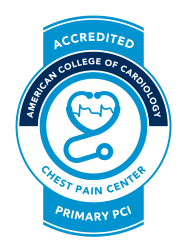Cardiology
Accredited Chest Pain Center with Primary PCI
Making Heart Health A Priority
Heart health is about more than just your heart. Blood pressure, cholesterol, family history and other factors all play important roles in keeping your heart strong. If you have questions about your heart health but aren’t quite sure where to begin, start with a heart health assessment and learn more about any risks you may have for heart-related conditions. As an accredited Chest Pain Center, your journey to a stronger heart starts here.

Cardiology Services
Taking care of your heart can be critical to maintaining good health so that you can do all the things you love.
Whatever your needs, our experienced team will help you access the right care, right in your community. We offer fast treatment for emergencies, diagnostic care, specialized treatment options and rehabilitative programs that can help keep your heart healthy for the long run.
Conditions we manage & treat:
- Congenital heart defects
- Congestive heart failure
- Coronary artery disease (narrowing of the coronary arteries)
- Heart valve disease
- Peripheral artery disease
- Vascular disease
Click the links below to learn more about our heart services:
Next Steps
Find a Cardiologist
Need help finding a cardiologist? We can help.
Heart Screenings & Imaging
An accurate diagnosis is the first step to treating heart disease. Learn more about the diagnostic services we offer.
Learn More About Chest Pain
As an accredited Chest Pain Center, we provide our patients with the best heart care treatment available.
Quality Heart Care, Close to Home
 The American College of Cardiology has recognized Canyon Vista Medical Center for its demonstrated expertise and commitment in treating patients with chest pain. Canyon Vista Medical Center was awarded Chest Pain Center Accreditation based on rigorous onsite evaluation of our team’s ability to evaluate, diagnose and treat patients who may be experiencing a heart attack.
The American College of Cardiology has recognized Canyon Vista Medical Center for its demonstrated expertise and commitment in treating patients with chest pain. Canyon Vista Medical Center was awarded Chest Pain Center Accreditation based on rigorous onsite evaluation of our team’s ability to evaluate, diagnose and treat patients who may be experiencing a heart attack.
